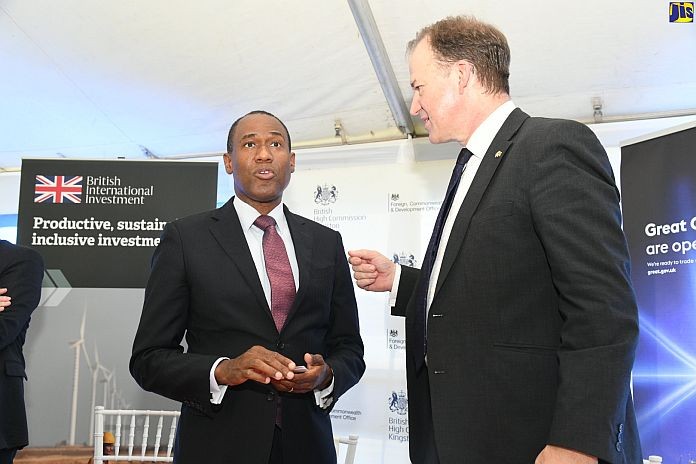By Rochelle Williams
KINGSTON, Jamaica, (JIS) – The return of the British International Investment (BII) to the region will offer a vital new source of finance for countries. It will prioritise investments in the private sector, particularly small and medium-sized enterprises (SMEs), with a focus on sustainable and scalable projects.
Addressing the launch of the BII on Tuesday, October 25, at the British High Commission in Kingston, minister of finance and the public service, Dr Nigel Clarke, welcomed the return of the BII to the region, after an absence of more than 20 years.
“We are very pleased, and we are very happy that BII is coming back to Jamaica. That opens the avenue for more and more investments that can help to improve standards of living in Jamaica and can help to transform the lived experience of the Jamaican citizen,” he said.
The minister added that the BII will be a vital investment partner in building out Jamaica’s critical infrastructure – renewable energy, water, and sewerage.
Dr Clarke noted, also, that significant investments will be needed to reduce Jamaica’s dependence on imported commodities, thereby strengthening Jamaica’s resilience against economic shocks from external factors.
“Having the extra investment dollars right here in Jamaica, right here in the Caribbean from BII will be absolutely addictive and something that we welcome and support,” the finance minister added.
For his part, minister for the Americas and Overseas Territories, Jesse Norman, said the BII is a key part of the UK government’s global plans to mobilise up to £8 billion a year of public and private-sector investments by 2025.
This will include BII partnering with capital markets, leveraging the city of London and other funds, to scale up financing for private-sector development.
“The BII has a long track record of investing to support private-sector growth around the world. I am pleased that we will now be supporting projects in the Caribbean. BII will help usher in a new wave of investments in clean and green infrastructure [and digital transformation], making investments that bolster financial institutions and businesses, create jobs, and boost trade,” Norman said.
In addition, he said the UK also continues to deliver vital support to the region through its multilateral partners – the World Bank, International Monetary Fund (IMF), Inter-American Development Bank (IDB) and Caribbean Development Bank (CDB).
Managing director, BII, Colin Buckley, said climate change is at the centre of BII’s strategy. In the past five years, the BII has invested more than $1 billion in climate finance in Africa and South Asia.
“Going forward, all of our investments will be Paris Aligned (Paris Agreement and Convention) and 30 percent of all our new investments will be climate finance. We are looking to invest in renewable energy generation, in helping companies adapt and become more resilient to climate change and to support new technologies like battery storage, green hydrogen, mini-grids and other off-grid solutions,” he outlined.
Formerly the Colonial Development Corporation (CDC), BII’s investments seek to create more productive, sustainable, and inclusive economies in Africa, Asia, and the Caribbean.
The CDC was founded in 1948. It opened its Caribbean office in Kingston in the early 1950s. It supported the development of hydroelectric power stations across Dominica and St Vincent, Saint Lucia, Grenada, Barbados, and Montserrat.
From the mid-sixties until the mid-nineties, the majority of the Caribbean portfolio was concentrated in Jamaica. The CDC assisted in creating the Jamaica Housing Development Company to provide mortgages for low-cost housing. It later financed the island’s commercial, industrial, tourist, port, harbour, and other infrastructure facilities.
By the 1970s, the CDC expanded across the Caribbean, investing in power, agribusiness, manufacturing, commerce, tourism, transport, financial institutions, telecoms, and IT.
The BII is the United Kingdom’s development finance institution. It assists in solving challenges to developing and emerging economies by investing flexible capital to support private-sector growth and innovation.





